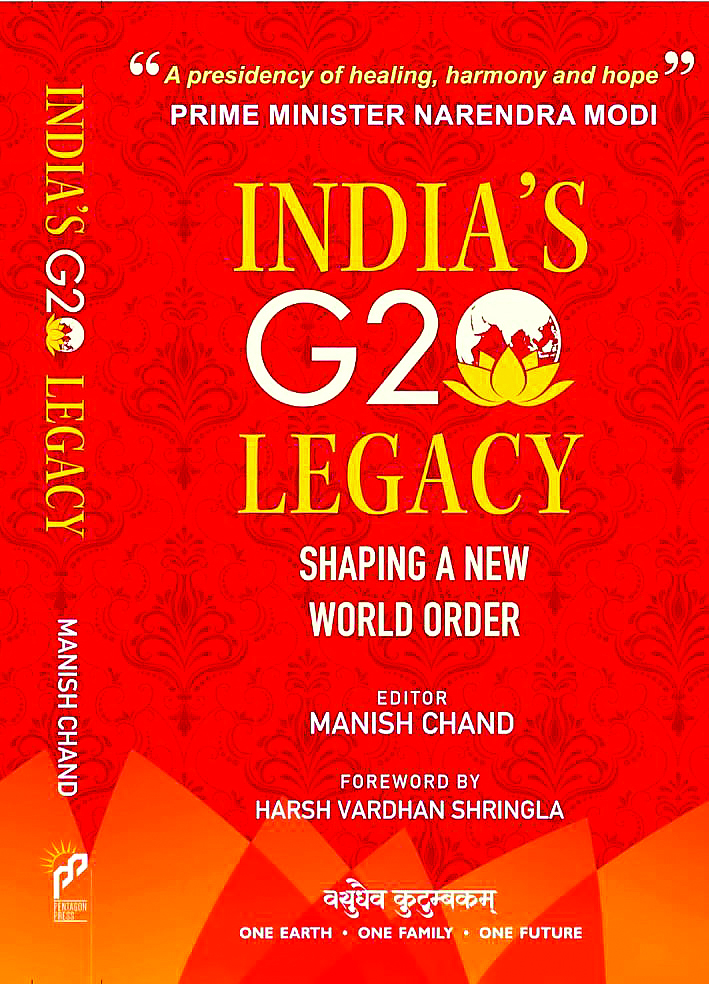NEW DELHI: India’s G20 Presidency exemplified how a developing nation at the forefront of G20 not only elevates the voices of Global South but also empowers emerging economies to take a leading role in confronting pressing global issues.
India’s year-long G20 presidency, which concluded on 30 November 2023 has left an indelible imprint and a lasting legacy. For years to come, India’s G20 will influence how the world addresses global challenges. The presidency was historic and transformational. It successfully bridged geopolitical divides to forge global unity, pivoted on the mantra of “One World, One Earth, and One Future.” The G20 New Delhi Leaders’ Declaration, achieved after hundreds of days and hours of intense negotiations, was historic and underscored the triumph of diplomacy and consensus over polarisation and politicking.
India’s G20 presidency, guided by Prime Minister Narendra Modi’s “inclusive, ambitious, decisive, and action-oriented” vision, was an exceptional demonstration of India’s best practices, values, and traditions. Guided by the ancient wisdom of “Vasudhaiva Kutumbakam,” India’s year at the helm of the G20 saw the world’s most powerful multilateral grouping undergo a significant transformation, most significantly in terms of the space given to the Global South.
Driven by Prime Minister Modi’s vision of taking G20 events across India, the G20 was transformed from an annual event into a mass movement, shifting the G20’s GDP-focused view of the world into a human-centric one.
While millions of words have been written, we need a holistic understanding and appreciation of India’s G20 legacy and how it will influence the evolution of multilateralism and help shape a more inclusive world. This book, “India’s G20 Legacy: Shaping a New World Order” edited by journalist, author and publisher Manish Chand, is therefore timely and a valuable guide to decoding India’s G20 presidency which has generated unprecedented international attention. Manish Chand has been ardently tracking India’s tryst with the G20 presidency much before it all started and this deep involvement and understanding shows in how this book has been curated and edited. This insightful book delves beyond the headlines, offering diverse perspectives, fresh insights, and critical evaluations of India’s transformative presidency. From the unexpected outcomes of policy shifts to the hidden gems of cultural diplomacy, Manish Chand’s curated collection unveils the nuanced story of India’s leadership and its lasting influence on the evolution of multilateralism.
The book’s most significant strength lies in presenting a diversity of viewpoints and perspectives on India’s G20 presidency by those who were directly involved with shaping it as well as veteran diplomats, practitioners, academics and authors from India and the rest of the world. With the baton passing on to Brazil in 2024-2025 and South Africa in 2025-2026, the book illuminates the outcomes India’s G20 presidency has for successive presidencies of the Global South and the future evolution of this crucial global grouping.
In a world fractured by conflict and shrouded in the fog of isolationist ideologies, “India’s G20 Legacy” shines as a beacon of hope. Through the vivid lens of India’s G20 presidency, the book eloquently underscores the vital role of bridge-building and consensus-building in navigating the tumultuous waters of our times. Its message resonates particularly with Brazil, as it embarks on its own G20 leadership journey. India’s story offers a roadmap for how to elevate the G20 beyond mere economic discussions and connect it to the aspirations of the people, paving the way for a more inclusive and equitable future for all.
For me, and many would agree with it, the most important legacy of India’s G20 presidency was its overarching focus on inclusivity, both domestically and internationally. Inclusivity was the prime focus in India’s G20, not just in terms of priorities, but also through organization. Prime Minister Modi recognized the power of using India’s G20 platform to celebrate the nation’s diversity, and illustrate how this very diversity could become a unifying factor on the global stage.
As I have written in my chapter on this theme in the book, India’s G20 Presidency exemplified how a developing nation at the forefront of the G20 not only elevates the voices of the Global South but also empowers emerging economies to take a leading role in confronting pressing global issues. From making the G20 more inclusive by welcoming the African Union as a permanent member to tackling the climate crisis, addressing the post-COVID deceleration of Sustainable Development Goals and navigating the complexities of the Ukraine conflict, India’s chairmanship showcased the power of shared purpose. It demonstrated that India, as the G20 Chair, not only championed policies aligned with its interests but also fostered increased multilateral cooperation.
India’s G20 leadership wasn’t just a moment, it was a movement. By firmly believing in inclusivity and demonstrating leadership by example, India ignited a spark of hope in a world yearning for a more equitable future. As we face the cascading challenges of our time, the spirit of “Vasudhaiva Kutumbakam” demands to be heard louder than ever. Thus, this book, rich with the transformational aspects of India’s legacy, isn’t just a testament to the past; it’s a clarion call to action.
(This article has been adapted from the Foreword to “India’s G20 Legacy: Shaping a New World Order,” edited by Manish Chand)
Harsh Vardhan Shringla served as the Chief Coordinator of India’s G20 Presidency and the Foreign Secretary of India.

